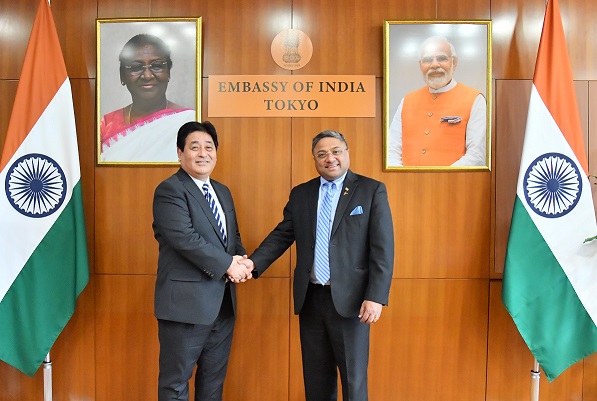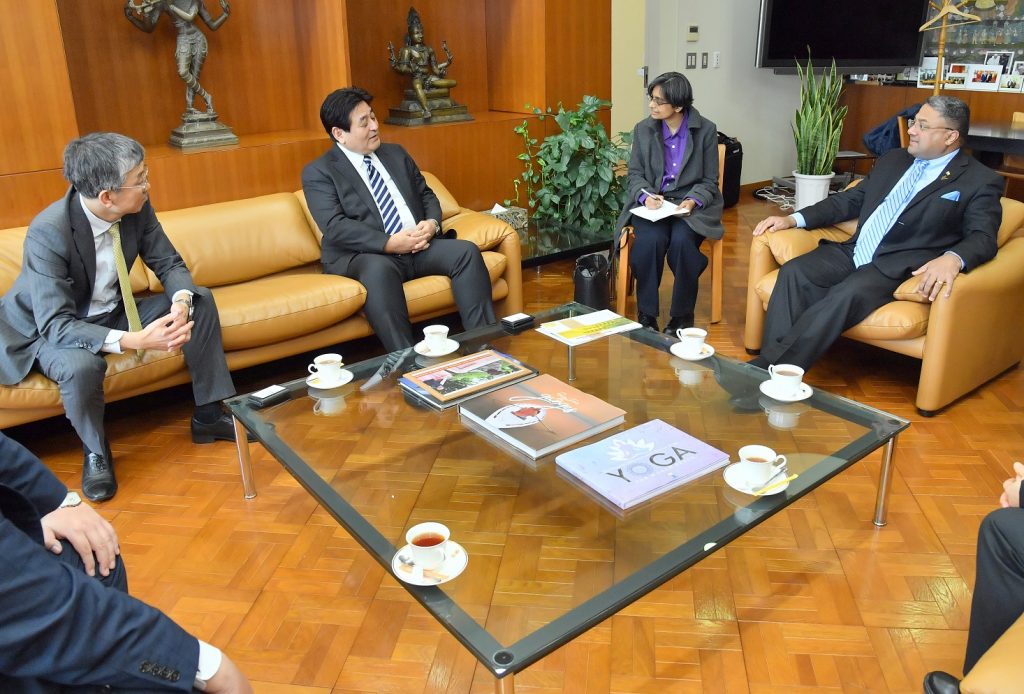India is the fastest-growing large economy in the world today. The country’s frenzied pace of development is reminiscent of the Japanese era of rapid economic growth and this is attracting foreign investors.
In March 2022, Prime Minister Fumio Kishida pledged a ¥5 trillion JPY ($33.8 billion USD) investment in India from Japan over the next five years. The promise was part of the growing economic partnership between the two countries. Sumitomo Realty & Development‘s plan to invest at least ¥700 billion ($4.73 billion) in the development of office buildings and retail facilities in central Mumbai is a significant contribution toward this.
In this connection, JAPAN Forward spoke to Sumitomo Realty & Development’s Director and Senior Managing Executive Officer Hisatoshi Katayama. He shared his company’s plans for ongoing and future projects in the context of the cooperation between India and Japan.
Excerpts follow.
Part of a series on Japan-India Relations

Sumitomo Realty & Development Commits to India
What made you choose India over other overseas destinations?
Having conducted market research over many years for a second base next to Tokyo for our business outside Japan, India stood out. It impressed us over and above destinations in other parts of the world in terms of market size and development constraints. Also, it was a market where we could be assured of stable revenues and growth over the long term.
India’s economic growth and vitality are unmistakable. A large number of top multinational companies from around the world are also rushing to establish a foothold in India. They include companies in Europe, North America, and Japan. There is, therefore, an urgent demand for high-quality, well-managed office space for lease. Furthermore, this demand is expected to only increase in the coming years.
Many large multinational companies already have offices in India. However, these offices are either in the suburbs, where there is plenty of space, or based on non-ideal makeshift arrangements in more central locations. There is, therefore, a huge untapped demand in India for well-built and well-managed office buildings.
Are there no local developers of office buildings in India?
Because of the extremely high interest rates in India, it is difficult for local developers to undertake long-term real estate development projects on their own. Developers, both commercial and residential, frequently subdivide these facilities into small portions and sell them off to individual buyers to accelerate funds recovery. As a result, it is rare to find an entire building owned and managed by a single developer.
Companies wanting to rent office space in a building frequently find themselves having to enter multiple contracts with diverse owners. That makes it a less-than-ideal situation.
Sumitomo Realty & Development has vast experience in office building development and management. That puts it in a great position to enter this market and fill the unmet need that exists.
Why did you choose Mumbai over other cities in India?
Mumbai is the commercial capital of India. Many multinational companies with a base in India would like to establish their head offices in central Mumbai. So, the demand for office buildings in this city is unmatched.
Of course, cities like New Delhi and Bengaluru are also major commercial hubs. We did look into them as well as part of our research. However, it was difficult to find substantial plots of land for development in centrally located areas in these cities.
In the case of Mumbai, we were very lucky to be able to acquire three sizeable plots of land in prime locations within the city. The Bandra-Kurla Complex (BKC) is a prominent business district. It also houses India’s National Stock Exchange, the headquarters of many banks, and many other retail and cultural facilities. Worli has a mix of residential, retail, and entertainment facilities.
Sumitomo Realty & Development is planning two office buildings for lease in BKC and a super high-rise mixed-use urban development project in Worli. The latter will include offices, a hotel, and retail facilities.
Challenges in India
What are some of the challenges of doing business in India for foreign real estate developers?
The biggest challenge for a real estate developer in India is land acquisition. For historical and sociopolitical reasons, acquiring land in India is extremely complicated and fraught with risks. Land prices in and around major cities are also exorbitant, with landowners unwilling to negotiate on pricing.
Another problem is that land ownership rights are frequently unclear. That means developers face the risk of becoming embroiled in complicated lawsuits from parties claiming ownership.
So, while business prospects for real estate developers in India are extremely promising, the entry costs are prohibitively high for most companies. Sumitomo Realty & Development has been very lucky in its acquisition of the Worli site from Bombay Dyeing. It was the previous owner of that site for around 150 years. Our other two sites in BKC have been taken on 80-year leases from the Mumbai Metropolitan Region Development Authority (MMRDA).

What are your plans for future business expansion in India?
Our ongoing development projects in BKC and Worli, combined, will exceed a gross floor area of 1.2 million square meters. They involve investments of around ¥700 billion. With rents for prime office space in BKC similar to those in central Tokyo, we expect a return on our investment nearly double that in Tokyo. This makes India very promising for us as a major overseas base, second only to Tokyo.
Our focus for the moment is on our BKC and Worli projects. However, we do hope eventually to use our expertise in redevelopment and other businesses to further expand our presence in India.

Creating a Sustainable Partnership
What are your plans for contributing to local communities and sustainable development in India?
Many cities in India, including Mumbai, face problems ranging from extreme air pollution to insufficient flood management. Japan has excellent flood management facilities. Indian officials visiting Japan frequently ask to tour Tokyo’s enormous network of underground tunnels to divert flood waters. Water management is, therefore, one area in which Japanese technology could be used to contribute to the local community.
There are many initiatives Sumitomo Realty & Development hopes to undertake. For example, recycling water for use in toilets and building air filtration using renewable energy. These will help us meet renewable portfolio standards in our own buildings, to begin with. But we also hope to eventually expand our efforts in this area to contribute to the wider community.
India has a strong culture of social contribution by big businesses. Sumitomo Realty & Development would very much like to be a part of this culture as we establish our presence in India.
What are some ways in which Japan can benefit from an economic partnership with India?
While there are many ways in which India can benefit from Japan’s prior experience in economic development, there are also many areas, such as information technology, in which India is now ahead of Japan.
Everywhere I go in India, I see people brimming with confidence and drive. As a nation too, India is increasingly making its mark in the global arena. Therefore, I see this as an opportunity for India and Japan to work together as equal partners. We can learn and benefit from each other as we both strive to the top.
This article was published in cooperation with Sumitomo Realty & Development.
RELATED:
Interview by: Yasuo Naito, Editor in Chief, JAPAN Forward




















